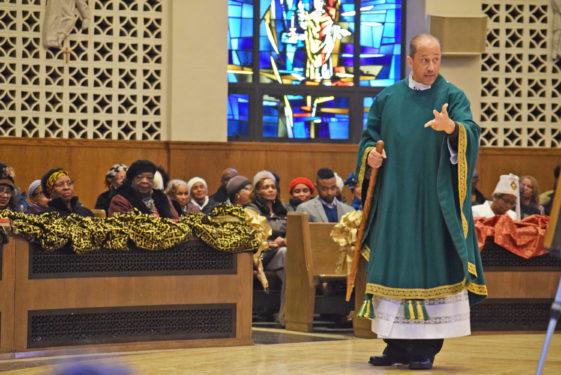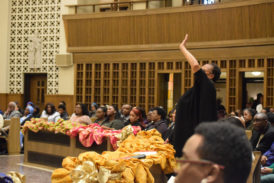Liturgy Offers Healing For Past, Hope and Strength for Future

At the annual Black History Month Mass held at Immaculate Conception Center in Douglaston Feb. 17, nearly 40 minutes of poignant preaching set the tone for a liturgy that offered words of healing for the suffering caused by the sins of racism and words of hope as the plight toward racial equality in America continues.
“Because if you are black and living in America, you shouldn’t be ashamed of all we’ve endured in these lands,” said guest homilist Father Tony Ricard from the Archdiocese of New Orleans, La.
“You shouldn’t be ashamed that we are descendants of an enslaved people. The fact that we are still here is living proof that we come from very strong people because many died in the Middle Passage, many were killed at the hands of simple slave masters, many died at the end of a whip or a noose. So the fact that we’re still here is proof that our ancestors were strong enough to even endure what we consider unbearable.”
The New Orleans native highlighted his preaching by incorporating African-American religious folksong that encouraged and welcomed spirit-filled reactions from the congregation.
As the visiting pastor began to sing, guests followed right along with the Negro spirituals that date back to the times when African slaves held informal gatherings during the 18th century at a time when practicing their faith was treated like treason.
During those secretive meetings, slaves would sing, chant, dance and even start to move in a trance.
As Christianity grew within the slave population, spirituals served as a way to express not only the community’s new faith, but also their sorrows and hopes.

Providing their vocal talents in the same solidarity through song was the Sister Thea Bowman Choir from Rockville Centre, led by Darcel Whitten-Wilamowski, from the Office of Multicultural Diversity. Inspired by the choir’s gospel sounds, guests stood up – even concelebrating priests – closed their eyes and lifted their prayers to God in the same fashion that their ancestors did.
Unified Diocesan Support
Sitting in the pews were attendees from both the Brooklyn Diocese and Rockville Centre. The main celebrant for the Mass was Auxiliary Bishop Neil Tiedemann, C.P., the diocesan vicar of ministry to black Catholics. Assisting at the altar were local and visiting bishops including retired Auxiliary Bishop Guy Sansaricq; Bishop Gabriel Malzaire of Roseau, Dominica; and Rockville Centre’s Auxiliary Bishop Richard Henning.
The visiting bishop from Long Island said that because the fact that a large population of African-Americans in the U.S. are Christian, it is a testimony to their unique witness within the Church. He also added that faith within the Church as a whole will play an important role toward reform in the community at large.
“The challenges of the 1960s were critically important but we’re in a different moment,” said Bishop Henning. “Maybe those reforms that happened then need to be taken a step further, but I think in order for that to happen, we all have to start listening to one another and I think tonight is one of those kind of events where we do that.”
Influential Black Catholics
After Mass, the community was welcomed for dinner and fellowship at the hall across the chapel. But before groups from a variety of ages gathered around the dining tables, they viewed information tables that highlighted different Black History Month civil rights heroes, including abolitionist Frederick Douglass, President Abraham Lincoln and Dr. Carter Woodson, the son of former slaves, who is considered the founder of Black History Month.
Influential black Catholics were mentioned throughout the event, like the late Franciscan Sister of Perpetual Adoration, Servant of God Sister Thea Bowman, who is on the path to canonization. The first slave to become a priest and also considered for sainthood, Servant of God Father Augustus Tolton was also mentioned as a pillar of faith.
More Work To Do
Peter Damour, youth minister from St. Clare’s, Rosedale, he said he felt empowered after listening to Father Ricard’s homily.
“I feel like there’s a lot more work to do,” said Damour. “I feel definitely challenged. It’s overwhelming in a good way but also overwhelming in a sense like ‘Wow, can I really do this?’ but it’s not more I, it’s we. That’s what our faith continuously taught us, that it’s all of us collectively. Catholic means universal.”































